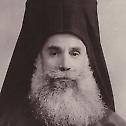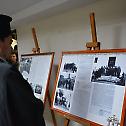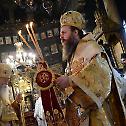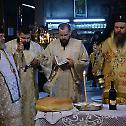Bulgarian Church celebrates 70th anniversary of martyrdom of Met. Boris of Nevrokop
On November 8, the Bulgarian Orthodox Church marked 70 years from the martyrdom of His Eminence Metropolitan Boris (Razumov) of Nevrokop who is widely venerated as a saint. October 26 also marked the 130th anniversary of his birth in the Bulgarian village of
As the site of the Bulgarian Orthodox Church writes, “Metropolitan Boris remains in the people’s memory through his education and erudition, with the flame of his words and the living confession of his faith in Christ, and his qualities as a true shepherd who laid down his life for his parishioners.”
In tribute to his merits, high spirituality, and martyrdom, with the blessing of His Eminence Metropolitan Seraphim of Nevrokop, the Blagoevgrad Municipality, South-West University “Neofit Rilski” and the Macedonian Scientific Institute organized a solemn two-day commemoration on November 16 and 17, including a series of events open to the general public.
On November 16 a solemn academic session was held presenting papers on the life and personality of Metropolitan Boris with the participation of representatives of the Bulgarian Orthodox Church and the academic community as well as prominent public figures and people whose memories have been sealed by His Eminence Metropolitan Boris.
Following the conference, an historical-documentary exhibition of photographs and documents from the life and service of Metropolitan Boris was opened, reports the site of the Bulgarian Orthodox Church.
In his report, Fr. Stoyan Berbatov spoke of how Met. Boris bravely rebuked every ideology that contradicts Christian values and virtues and warned of the preaching of atheism in schools.
“The schools strive to convey to our children that our ancestors were animals and derived from animals,” the holy
Other talks focused on his zealous efforts to further educate his clergy, his social activity, personal memories of him, and the movement to see him glorified as a saint of the Church.
The celebration continued the next day with the Hierarchical Divine Liturgy in the Church of the Entrance of the Mother of God, after which a
“I am sure that you have love in your heart for him, as a sign of respect for his bright memory, not as some cult, but as the glorification of God in His saints. That is what brings us together today,” Met. Seraphim of Nevrokop said during the memorial services.
Watch the Divine Liturgy and service at his grave below:
***
The Metropolitan a Martyr
Metropolitan Boris of Nevrokop has left a deep trace of his life and memory for both the Christians and priests of the Nevrokop Diocese and the life of the Bulgarian Church at large.
The future Bishop Boris was born on the feast of St. Dimitar of Thessalonica in 1888 in the village of
He was also a writer: He wrote for the Church newspaper, published his poems, and was the author of the famous brochure “The Crisis in Our Schools.” In choosing Fr. Boris as Metropolitan of the Diocese of Nevrokop, Professor Hristo Gyaurov wrote: "Every nation needs not only political leaders, but at the same time, and even more so spiritual leaders. Of such leaders, the Bulgarian people now have a special need. When the newly-elected Metropolitan of Nevrokop occupies his place in the Diocese of Nevrokop, designated by God, he will enter into the number of these leaders of the Bulgarian people.” Canonically elected in 1935, Metropolitan Boris assumed the headship of the Nevrokop Diocese. He was met with great enthusiasm in the diocese by thousands of godly Christians.
Almost immediately after his start as a
Met. Boris was murdered by Elijah Stamenov, a former priest whom he refused to accept back into the ranks of the priesthood. According to
The holy
Stamenov was sentenced to seven years in prison, of which he spent three under a mild regime, but ended in the madhouse, repeatedly saying, “I killed him, I killed him ...”
On March 31, 2016, the Holy Synod of the Bulgarian Orthodox Church, after examining the letter of Metropolitan Seraphim of Nevrokop, gave its blessing to begin the procedure for the canonization of Met. Boris.
The last of the 76 poems published by Metropolitan Boris sounds like a summary of his entire life:
My love - Angelic habit.
My hope - virgin clothing.
My dreams - brilliant stars.
My desires - blameless suffering.
My early age - a martyr’s cross.
My Way in Life - The Way to Golgotha.
Source: Orthochristian.com





